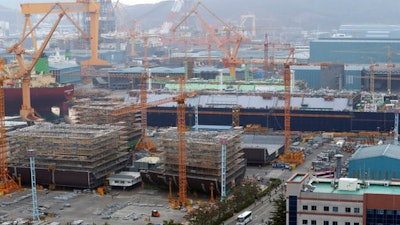
SEOUL, South Korea (AP) — South Korea announced Thursday a fresh capital injection for Daewoo Shipbuilding & Marine Engineering Co., seeking to prevent the world's second-largest shipbuilder from defaulting on its debts.
The injection of 2.9 trillion won ($2.6 billion) in additional loans will prevent Daewoo from going bankrupt when some of its debt matures next month, which could have had a damaging impact on the economy, the Financial Supervisory Commission said in a statement.
This new bailout, a second round since more than a $3 billion in aid two years ago, is conditional upon Daewoo creditors and bondholders reaching an agreement on swapping more than half of their debt for Daewoo equity. It also requires Daewoo to continue slashing jobs, cutting salaries, selling assets and shutting down loss-making businesses such as its offshore drilling.
"The creditors failed to apply conservative estimates and better respond to the potential risks in Daewoo Shipbuilding such as the prolonged downturn in the shipbuilding industry and we are greatly sorry for that," said Lee Dong Geul, chairman of the state-owned Korea Development Bank, which took over the shipbuilder in 2000.
It is unclear if this latest rescue will be a lifeline for Daewoo or merely delay its demise. A total of 1.6 trillion won ($1.4 billion) of debt will mature over the next year, and Daewoo's capital has been running dry. Reaching agreement on the debt for equity swap may prove difficult: the company's shares were suspended from trading in July after it was found to have inflated profits and understated its costs.
Letting Daewoo go bankrupt now would cause ripple effects worth up to 59 trillion won ($53 billion), the commission said, citing a study by a private accounting firm. Delaying its bankruptcy would allow the shipbuilder to complete pending orders of 114 vessels, according to the financial regulator.
Some 50,000 jobs at Daewoo and its contractors are at stake. Giving up also would result in the waste of billions of dollars of taxpayers' money that the government has spent on Daewoo since the shipbuilder's former parent group collapsed in the 1997-1998 Asian financial crisis.
Daewoo's latest woes come at a delicate time for South Korean politics. The country is holding a snap presidential election in May to the impeachment of Park Geun-hye in an influence-peddling scandal.
The country's prime minister is overseeing the administration until the election.
The financial regulator said the Daewoo matter was too urgent to wait until the next president takes office.
"Without additional measures, Daewoo Shipbuilding will go bankrupt and its bankruptcy will be inevitable," it said in the statement.
Daewoo received 4.2 trillion won from the government in 2015 and another 2.8 trillion won in November to shore up its capital. Those moves triggered debates over whether the government should save Daewoo Shipbuilding, while letting Hanjin Shipping, South Korea's largest ship liner, go bankrupt.
The government admitted that its forecast when announcing the 2015 bailout was too rosy and vowed to make more conservative estimates in the future. Daewoo failed to meet its $11.5 billion target for new ship orders in 2016, booking only $1.5 billion.
The entire shipbuilding industry is in crisis as growth in shipping slows. South Korea, home to the world's three largest shipyards, took the brunt of the downturn. The country's unemployment rate has reached its highest level in more than a decade as Hyundai Heavy Industries, Daewoo Shipbuilding and Samsung Heavy Industries shed tens of thousands of jobs.
Despite heavy job cuts, selling non-essential assets such as real estate and other restructuring efforts, Daewoo Shipbuilding reported an annual net loss of 2.7 trillion won in 2016, its fourth straight annual loss.
The company has been cited as an example of moral hazard at a state-owned company after its former CEO and former chief financial officer were convicted of embezzlement and breach of trust.






















